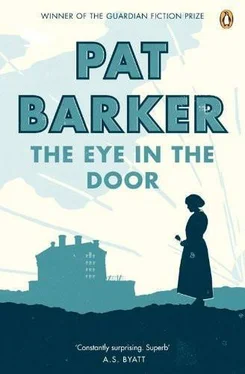A laborious business, made more so by the need to duplicate the wounds of two patients on every cadaver. One of the more surprising consequences of the war was a shortage of suitable male corpses.
Rivers lifted his hands to his chin, smelling the medical school smell of human fat and formaldehyde, only partially masked by carbolic soap. He watched Head’s expression as he looked at Lucas’s shaved scalp, and realized it differed hardly at all from his expression that morning as he’d bent over the cadaver. For the moment, Lucas had become simply a technical problem. Then Lucas looked up from his task, and instantly Head’s face flashed open in his transforming smile. A murmur of encouragement, and Lucas returned to his drawing. Head’s face, looking at the ridged purple scar on the shaved head, again became remote, withdrawn. His empathy, his strong sense of the humanity he shared with his patients, was again suspended. A necessary suspension, without which the practice of medical research, and indeed of medicine itself, would hardly be possible, but none the less identifiably the same suspension the soldier must achieve in order to kill. The end was different, but the psychological mechanism employed to achieve it was essentially the same. What Head was doing, Rivers thought, was in some ways a benign, epicritic form of the morbid dissociation that had begun to afflict Prior. Head’s dissociation was healthy because the researcher and the physician each had instant access to the experience of the other, and both had access to Head’s experience in all other areas of his life. Prior’s was pathological because areas of his conscious experience had become inaccessible to memory. What was interesting was why Head’s dissociation didn’t lead to the kind of split that had taken place in Prior. Rivers shifted his position, and sighed. One began by finding mental illness mystifying, and ended by being still more mystified by health.
Lucas had finished. Head leant across the desk and took the drawing from him. ‘Hmm,’ he said, looking at the remarkably cow-like creature in front of him. A long pause. ‘What’s an elephant got in front?’
Again the blurting voice, always on the verge of becoming a wail. ‘He got a big’ — Lucas’s good hand waved up and down — ‘straight about a yard long.’
‘Do you know what it’s called?’
‘Same what you. Drive. Water with.’
‘Has he got a trunk? ’
Lucas wriggled in his wheelchair and laughed. ‘He lost it.’
He reached for his drawing, wanting to correct it, but Head slipped it quickly into the file. ‘Sums now.’
They went quickly through a range of simple sums. Lucas, whose ability to understand numbers was unimpaired, got them predictably right. It was Head’s custom to alternate tasks the patient found difficult or impossible with others that he could perform successfully. The next task — designed to discover whether Lucas’s understanding of ‘right’ and ‘left’ was impaired — involved his attempting to imitate movements of Head’s arms, first in a mirror and then facing him across the desk.
Rivers watched Head raise his left hand — ‘professional in shape and size;… large, firm, white and comely’ — and thought he probably knew that hand better than any part of his own body. He’d experimented on it for five years, after all, and even now could have traced on to the skin the outline of the remaining area of protopathic innervation — for the process of regeneration is never complete. A triangle of skin between the thumb and forefinger retained the primitive, all-or-nothing responses and remained abnormally sensitive to changes in temperature. Sometimes, on a cold day, he would notice Head shielding this triangle of skin beneath his other hand.
For a while, after the tests were complete, Head chatted to Lucas about the results. It was Head’s particular gift to be able to involve his patients in the study of their own condition. Lucas’s face, as Head outlined the extent of his impairments, was alight with what one could only call clinical interest. When, finally, an orderly appeared and wheeled him out of the room, he was smiling.
‘He has… improved,’ Head said. ‘Slightly.’ He brushed his thinning hair back from his forehead and for a moment looked utterly bleak. ‘Tea?’
‘I wouldn’t mind a glass of milk.’
‘Milk?’
Rivers patted his midriff. ‘Keeps the ulcers quiet.’
‘Why, are they protesting?’
‘God, how I hate psychologists.’
Head laughed. ‘I’ll get you the milk.’
Rivers glanced at The Times while he waited. In the Pemberton Billing trial they’d reached the medical evidence — such as it was. As Head came back into the room, Rivers read aloud: ‘“Asked what should be done with such people. Dr Serrel Cooke replied, ‘They are monsters. They should be locked up.’” The voice of psychological medicine.’
Head handed him a cup. ‘Put it down, Rivers.’
Rivers folded the paper. ‘I keep trying to tell myself it’s funny.’
‘Well, it is, a lot of it. It was hilarious when that woman told the Judge his name was in the Black Book.’ He waited for a reply. ‘Anyway, when do you want to see Lucas? Tomorrow?’
‘Oh, I think we give the poor little blighter a rest, don’t we? Monday?’
They talked for a while about Lucas, then drifted into a rambling conversation about the use of pacifist orderlies. The hospital contained a great many paralysed patients in a building not designed to accommodate them. There were only two lifts. The nurses and the existing orderlies — men who were either disabled or above military age — did their best, but the lives of patients were inevitably more restricted than they need have been. What was desperately required was young male muscle, and this the pacifist orderlies — recruited under the Home Office scheme — supplied. But they also aroused hostility in the staff obliged to work with them. It had now reached a point where it was doubtful whether the hospital could go on using them. The irrationality of getting rid of much needed labour exasperated Rivers, and he had spoken out against it at the last meeting of the hospital management committee, rather too forcefully, perhaps, or at least Head seemed to think ‘so. ‘I’m not g-going b-back on it,’ he said. ‘I’ve spent m-most of my l-life t-t-toning down what I w-wanted to s-say. I’m not d-doing it any more.’
Head looked at him. ‘What happened to the gently flowing Rivers we all used to know and love?’
‘Went AWOL in Scotland. Never been seen since.’
‘Yes.’
‘Yes what?’
‘Yes, that was my impression.’
The lift door was about to close. Rivers broke into a run, and Wantage, one of the non-pacifist orderlies, clanged the gate open again. ‘There you are, sir,’ he said, stepping back. ‘Room for a thin one.’
He was returning a man in a wheelchair to the ward. Rivers squeezed in beside the wheelchair and pressed the button for the top floor.
Wantage was the most popular of the orderlies, partly because his built-up boot supplied an instant explanation for why he wasn’t in France. He was a fat, jolly man with a limitless capacity for hate. He hated skivers, he hated shirkers, he hated conchies, he hated the Huns, he hated the Kaiser. He loved the war. He had the gentlest hands in the hospital. He would have given anything to be able to go and fight. Whenever Rivers saw him lurching along behind a wheelchair, he was reminded of the crippled boy in the Pied Piper story, left behind when the other children went into the mountain.
At the second floor the lift stopped and a young nurse got in. Viggors, the patient in the wheelchair, spoke to her, blushing slightly — she was evidently a great favourite — and then sat, slumped to one side, his eyes level with her waist, gazing covertly at her breasts. Wantage chattered on. On the third floor the lift stopped again and Wantage pushed the wheelchair out.
Читать дальше












